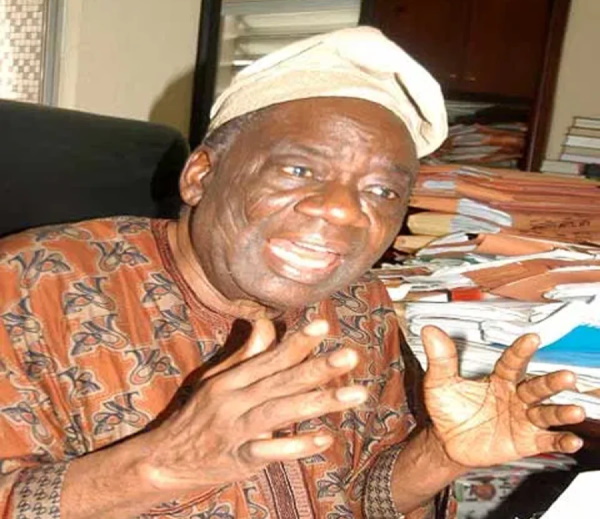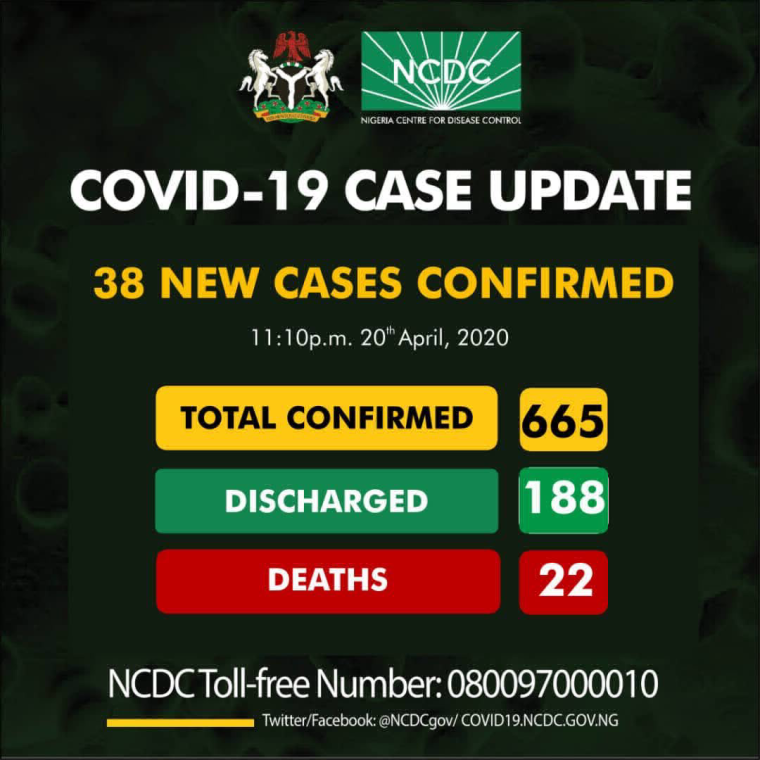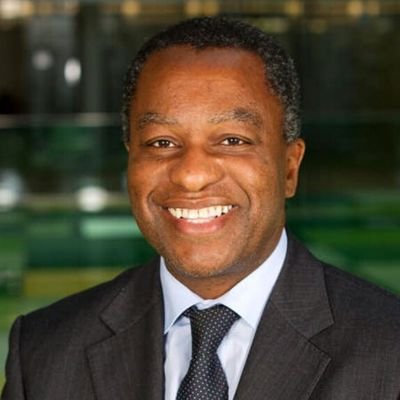Groups
-
david-manglideposted in News & Trends • read more

Nigeria’s Second Republic Attorney General and Minister of Justice, Chief Richard Akinjide, is dead.He was 88. He died in his Ibadan, Oyo State, home early today.
Mr Toye Akinrilola, spokesman of the UCH, said his body was brought to the morgue at about 2 am today.
Akinjide, a reputable lawyer and senior advocate, played a prominent part in Nigeria’s politics in the first and second republics.
He was the Minister of Education in the First Republic and a member of the Constitutional Drafting Committee between 1975-1977.
When the Second Republic politics began in 1978, he joined the National Party of Nigeria.
He served as the legal adviser for the NPN and was rewarded with the post of Justice Minister.
Akinjide was born in Ibadan on 4 November 1931.
He was educated at Oduduwa College, Ile-Ife. He left Nigeria in 1951 to read law and was called to the English Bar in 1955.
-
david-manglideposted in News & Trends • read more

A South African man has been arrested by the police for trying to smuggle his girlfriend in the back of his car amidst a nationwide lockdown to curb the spread of COVID19.
According to an official from the province of Gauteng, said the woman was found in the car booth during a stop and search at a roadblock in the province.
The driver who did not have a permit, was headed to the Eastern Mpumalanga province. Authorities say the woman was also arrested for consenting to be smuggled
South Africa government imposed a nationwide lockdown on March 24th for three weeks but the lockdown has been extended until the end of April.
-
david-manglideposted in News & Trends • read more

The Food Kitchen Programme initiated by the governor of Lagos state, Babajide Sanwo-Olu was rejected by the youth in the Oworo area of the state.In a video that surfaced on social media, the agents deployed to the area were asked by the residents to leave the area. They argued that the planned food distribution is a slap on their faces and the government is expected to do more than that.
Sanwo-Olu had last week announced the daily food kitchen programme to feed at least 100,000 youths in the state.
“In the next couple of days we will commence what we call a daily food kitchen programme, which will be an attempt to feed 100,000 youths,” Sanwo-Olu said in a press briefing. This we believe will meet some of the immediate challenges that we have seen in the street,” he had said
Sanwo-Olu Food Kitchen in #Oworonshoki got chased away by very angry residents pic.twitter.com/Fn7Z8zg5D1
— Laila Ijeoma | Lailasnews.com (@LailaIjeoma) April 20, 2020The governor also said there will also be “unconditional cash transfer to 250,000 vulnerable residents and economically challenged persons” who have identification numbers with Lagos State Residents Registration Agency.
-
david-manglideposted in News & Trends • read more

Thirty-eight new cases of #COVID19 have been reported;23 in Kano
5 in Gombe
3 in Kaduna
2 in Borno
2 in Abia
1 in FCT
1 in Sokoto
1 in EkitiAs at 11:10 pm 20th April there are 665 confirmed cases of #COVID19 reported in Nigeria.
Discharged: 188
Thirty-eight new cases of #COVID19 have been reported;
— NCDC (@NCDCgov) April 20, 2020
23 in Kano
5 in Gombe
3 in Kaduna
2 in Borno
2 in Abia
1 in FCT
1 in Sokoto
1 in Ekiti
As at 11:10 pm 20th April there are 665 confirmed cases of #COVID19 reported in Nigeria.
Discharged: 188
Deaths: 22 pic.twitter.com/k354y8KS0W
Deaths: 22As at 11:10pm 20th April, breakdown of cases by states:
— NCDC (@NCDCgov) April 20, 2020
Lagos-376
FCT-89
Kano-59
Osun-20
Oyo-16
Edo-15
Ogun-12
Kwara-9
Katsina-12
Bauchi-7
Kaduna-9
Akwa Ibom-9
Delta-4
Ekiti-4
Ondo-3
Enugu-2
Rivers-2
Niger-2
Benue-1
Anambra-1
Borno-3
Jigawa-2
Abia-2
Gombe-5
Sokoto-1 -
david-manglideposted in Primary 5 • read more
Subject: Bible Knowledge
Topic: Jesus Conquers the Devil
Duration: 40mins
Reference Material: Christian Religious Knowledge for Primary School, 5
Previous Knowledge: Pupils are familiar with Jesus the son of God
Objective: At the end of the lesson, pupils should:
- Explain how they can overcome the devil
- Explain how they can forsake any attitude that seems devilish
Content:
God created the angels as His messengers, He wanted them to remain faithful to Him. Some angels disobeyed God and were sent out of Heaven. The leader of the bad angels was Lucifer. Since the bad angels were sent away from Heaven, they have been moving about in the world and causing trouble.
Satan tempted Job, the faithful servant of God, but he did not fall. After the temptation, Job was rewarded.
Jesus too was tempted after he fasted for forty days and forty night. He was tempted three times by the devil.
In order to conquer the devil, we have to be close with God and to pray at all time. We should also put in the armour of God, equip ourselves with truth and righteousness. Jesus was able to conquer the devil by fasting, praying, doing the will of God, being truthful and righteous.
Presentation:
Step 1: Teacher revises the previous lesson with the pupils.
Step 2: Teacher introduces and explains the new topic to the pupils.
Step 3: Pupils are allowed to ask questions.
Step 4: Teacher writes notes under content on the board for pupils to copy.
Evaluation:
- Who is the leader of the bad angels?
- How can we overcome temptation?
Conclusion: Teacher moves round for inspection, marking and correction of notes where necessary.
-
david-manglideposted in Primary 5 • read more
Subject: Computer Education
Topic: Typewriter
Duration: 40mins
Reference Material: Basic Computer Education for the New Generation 5
Instructional Material: Picture of a Typewriter
Previous Knowledge: Pupils are familiar with the computer.
Objective: At the end of the lesson, pupils should:
- State when the typewriter was invented
- Mention when the keyboard was rearranged
Content:
Typewriter is a manual typing machine with keys. Before the use of computer keyboard, there was a machine that has many button parts and also look very much like the computer keyboard.
Typewriter was the first writing machine made by a British Inventor called Henry Mill in 1714. It has a carriage that can be moved to the right or left side. It has a handle for turning the paper from time to time when you are tying. It has a place called type bar which has the printed letters over it.
Typewriter has a keyboard which were first arranged in alphabetical order. In 1875, Amos Densmore and Christopher Sholes rearranged the typewriter keyboard so that the letter would not be so close together and the type bars would be at the opposite direction. This new arrangement was known as the “QWERTY” arrangement.
There are two types of typewriter namely:
- The Electric Typewriter
- The Manual Typewriter
Presentation:
Step 1: Teacher revises the previous lesson with the pupils.
Step 2: Teacher introduces and explains the new topic to the pupils.
Step 3: Pupils are allowed to ask questions.
Step 4: Teacher writes notes under content on the board for pupils to copy.
Evaluation:
- What is a Typewriter?
- List the types of Typewriter
- Who invented the Typewriter?
Conclusion: Teacher moves round for inspection, marking and correction of notes where necessary.
-
david-manglideposted in Primary 5 • read more
Subject: Health Science
Topic: Rhythmic Activities
Duration: 40mins
Reference Material: Physical and Health Education for Primary School, 5
Previous Knowledge: Pupils are familiar with exercise.
Objective: At the end of the lesson, pupils should:
- Define Rhythmic Activities
- List and demonstrate examples of rhythmic activities
Content:
Rhythmic activities are activities that have a regular or repeated pattern of sounds movements or occurrence e.g. marching, galloping and hopping, others are blowing of flute, beating of drums, dancing etc.
Marching
Marching is walking with stiff lifting of the legs in regular steps, with the head and the body erect, and both hands swing one after the other.
Galloping
Galloping is moving very fast with the feet rising and dropping at the same time.
Hopping
Hopping is done by jumping with the feet as quick and as often as possible, the performer stand with feet together knees slightly bent with the body leaning forward. He/She then pushes off the foot with the body lifted off the ground and swings the arms upwards to help the upward lift.
Presentation:
Step 1: Teacher revises the previous lesson with the pupils.
Step 2: Teacher introduces and explains the new topic to the pupils.
Step 3: Pupils are allowed to ask questions.
Step 4: Teacher writes notes under content on the board for pupils to copy.
Evaluation:
- What are rhythmic activities?
- Demonstrate (i) Marching (ii) Hopping
Conclusion: Teacher moves round for inspection, marking and correction of notes where necessary.
-
david-manglideposted in Primary 5 • read more
Subject: Social Studies
Topic: Resource Development and Distribution
Duration: 40mins
Reference Material: Easyway to Social Studies for Primary School, 5
Previous Knowledge: Pupils are familiar with organisation.
Objective: At the end of the lesson, pupils should:
- Define Resources (b) Mention types of resources
- Mention reasons for uneven distribution of resources
- List ways of ensuring even distribution of resources.
Content:
Resources are what we use to develop products or accomplish a task, it can be human or material.
Capital is the amount of money a person has, which can be used in producing things; capital can be used for the following:
- Provision of social amenities e.g. road, water, electricity
- Payment of workers
- Investment
- Buying property
- Assisting other nations
There are four basic types of resources we use in developing the society.
These are: (a) land (b) labour (c) capital (d) entrepreneurs
Resources are not available in all prats of the country.
Reasons for Uneven Distribution of Resources
- Nature Lack of access (bad road) iii. Location of market iv. Politics
Ways of Ensuring Even Distribution of Resources
- Making deliberate policies to develop the rural area.
- Establishment of industries in other places apart from the cities.
- Provision and spread of social amenities around the country.
- Provision of incentives to encourage people to invest in business in the rural areas.
Presentation:
Step 1: Teacher revises the previous lesson with the pupils.
Step 2: Teacher introduces and explains the new topic to the pupils.
Step 3: Pupils are allowed to ask questions.
Step 4: Teacher writes notes under content on the board for pupils to copy.
Evaluation:
- What is Capital?
- List reasons for uneven distribution of resources.
Conclusion: Teacher moves round for inspection, marking and correction of notes where necessary.
-
david-manglideposted in Primary 5 • read more
Subject: Agricultural Science
Topic: Livestock Production
Duration: 40mins
Reference Material: Agricultural Science for Primary School, 5
Previous Knowledge: Pupils are familiar with general requirements for livestock production.
Objective: At the end of the lesson, pupils should:
- Define Livestock Production and Animal Husbandry
- Mention examples of animals that can be reared on a farm
Content:
Livestock production is the rearing of animals for the benefit of man. It can also be referred to as animal husbandry.
Animal husbandry may be defined as the breeding, feeding and management of animals for the production of food, fibre work and for pleasure. This types of farming may also be referred to as pastoral farming in which animals are allowed to graze in the fields, examples of animals that can be reared on a farmland include: cattle, goat, sheep, dog, buffalos, fowl, horse, camel, pig etc.
Horse: are animals known for their speed, strength and endurance. A male horse is known as a “mare”. The young horse is called “Foal”.
Camel: It is a ruminant animal with one or two humps on the back. They are used as a means of transportation and a source of milk, meat, wool and hides. They have the ability to survive for a long period of time without food and water. The fatty lumps act as store of fat that provides nutrition when no food is available.
Camels are of two types i.e.
- Arabian camel: It has only one hump.
- Bacterian camel: It has two humps.
Presentation:
Step 1: Teacher revises the previous lesson with the pupils.
Step 2: Teacher introduces and explains the new topic to the pupils.
Step 3: Pupils are allowed to ask questions.
Step 4: Teacher writes notes under content on the board for pupils to copy.
Evaluation:
- What is Livestock Production?
- Mention four animals that can be reared on a farmland
Conclusion: Teacher moves round for inspection, marking and correction of notes where necessary
-
david-manglideposted in News & Trends • read more

The Minister of Foreign Affairs, Geoffrey Onyeama, has said the late Chief of Staff to the President, Mallam Abba Kyari, was his best man when he got married several years ago.Onyeama, in a tribute titled ‘Tribute to Kyari: The Best Man,’ on Sunday, spoke fondly of the late presidential aide, saying he was also the godfather to his first son.
The minister stated, When I got married in Owo to my wife from Idoani, Ondo State, Abba was my Best-Man. The officiating Vicar was somewhat perplexed because I was a Roman Catholic Igbo, marrying an Anglican Yoruba in an Anglican church with a Muslim Kanuri/Shuwa Arab Best-Man from Borno State!
The officiating Catholic priest in Geneva, Switzerland, two years later, during the baptism of our first son, was equally perplexed when a muslim Abba Kyari and a muslim Muni Attah-Sonibare were the Godfather and Godmother respectively!
Abba was a Pan-Nigerian, global citizen, who recognized no boundaries between peoples, be they racial, ethnic, religious, class or political. He made friends with everyone.
Onyeama said he first met Abba Kyari in 1977 at Warwick University in England, where the would-be minister went to study law as a second undergraduate degree.
He (Kyari) had come to do a degree in sociology. I had a pending application to do Law at Cambridge and when the result of that application came and it was positive, I left Warwick during the second semester.
But my five months at Warwick was enough to build a strong friendship with Abba that lasted till his passing. Almost 43 years!
There was a small group of Nigerians at Warwick then, which included former President Yakubu Gowon (who was doing a PhD in Political Science); Senator Osereihmi Osunbor (former Senator and Governor); Sitonye Roy Wakama (former Deputy Inspector General of Police) and the lawyer, Desmond Guobadia. There were a few other Nigerians, he said.
The minister described Kyari as quite skinny in those days, adding that they became friends very quickly and that a life-long bond was formed.
According to him, Abba was very simple, humble and very friendly with everyone.
Onyeama said, He had very little interest in material things. We had a common interest in politics and I believe it was our socialist political values that cemented our friendship because we were always discussing politics and how to salvage Nigeria right up to his passing.
Abba was also surprisingly sociable for someone who was so self-effacing and we had a lot of enjoyable and memorable experiences at parties and discotheques! Abba also had a very good sense of humour belied by his often stern visage.
When I left Warwick University for Cambridge, Abba came to Cambridge to introduce me to his friends there as he had studied in the city for his Advanced levels. After graduating from Warwick University, Abba went up to Cambridge to study law.
He stated that they both kept in touch throughout the last 43 years and ended up together in Lagos in 1982 to attend Law School for a year.
The minister said, When he left Nigeria in 1985 to work in Geneva for 30 years, Abba came to Geneva often to stay with me and whenever I was in Nigeria, he made it a point of coming to see me wherever I was.
Abba was a man of unimpeachable integrity. Absolutely incorruptible! I remember after he got married to his wonderful wife, Kulu, he told me how he showed her his first paycheck so she would know that he was not wealthy and would not steal!
It broke my heart to see all the false allegations against him on issues of corruption. He showed me the safe in his office where he put any unsolicited gift.
Onyeama stated that he had asked Kyari about rumours making the rounds that he was making money from the fine imposed on MTN.
He immediately showed me the memorandum setting up the Committee to deal with the issue and he was not even a member. He also showed me how he had been able to block attempts by many influential and powerful persons to make a lot of money at the expense of the country.
He knew that fighting corruption with such single mindedness and fearlessness would see him at the receiving end of the venom of very powerful forces but was undeterred and preferred to ignore all the defamation against him, he said.
The minister further described Kyari as loyal to a fault, saying the chief of staff decided he was going to protect his boss, the President, Major General Muhammadu Buhari (retd.), at all costs and that he would take any number of bullets for him, and he did!
He added, Since he became Chief of Staff to the President, Abba never rested. He worked day and night, seven days a week. He was a hard taskmaster who did not suffer fools gladly. A very demanding boss. He gave a lot of himself and expected his subordinates and colleagues to do the same.
He was very intelligent, very well-read and had a wide and varied professional experience. He held strong opinions and did not yield position easily. But once he believed in someone or a cause, he would fight with everything he had.
Onyeama said Kyari believed completely in the Nigerian project and in Buhari.
He concluded, During the last five years he gave every second of his life for the success of both. His health suffered as a result but it was a sacrifice and investment he was happy to make. Nigerians will look back in years to come and see that he was truly the Best Man. Rest in peace, my brother.